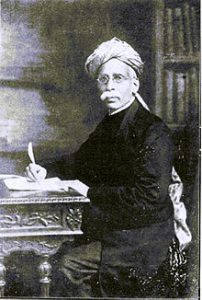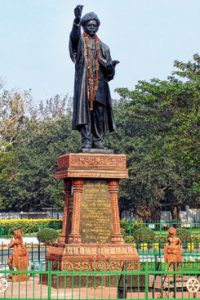 By Hemanta Pande: Madhusudan Das, popularly known as Kulabruddha (Grand Old Man),Utkal-Gourab (Glory of Odisha), was the architect of the province (now state) known as Orissa ( now Odisha). He was a visionary par excellence and a tireless worker for the socio-political and economical upliftment of the people. He not only spearheaded the campaign for separate Odisha province but also fought for the freedom of expression, education, rural development and labour reforms. In his illustrious career, Madhu Babu acted as legislature, lawyer, and teacher as well as enlightened the world as a social worker, political reformer, litterateur, industrialist and statesman.
By Hemanta Pande: Madhusudan Das, popularly known as Kulabruddha (Grand Old Man),Utkal-Gourab (Glory of Odisha), was the architect of the province (now state) known as Orissa ( now Odisha). He was a visionary par excellence and a tireless worker for the socio-political and economical upliftment of the people. He not only spearheaded the campaign for separate Odisha province but also fought for the freedom of expression, education, rural development and labour reforms. In his illustrious career, Madhu Babu acted as legislature, lawyer, and teacher as well as enlightened the world as a social worker, political reformer, litterateur, industrialist and statesman.
Born in a remote village of Satyabhamapur in the district of Cuttack on 28th April 1848, Madhu Babu had earned “the First of Odisha” for many reasons; for instance, he was the first Odia Graduate, the first Odia Master in Arts, the first Odia to hold a degree in law, first Odia to become a member of both the legislative council and the Central Legislative Assembly of India, first Odia to sail overseas, so on and so forth. He is remembered for his remarkable contributions in various fields, some of which are discussed below.
- The Lawyer
After returning to Odisha from Calcutta in 1881, Madhu Babu started his legal practice. His insight knowledge on this field and his neat interpretation of the law helped him to earn sufficiently in those days. However, he spent all his earnings for the common cause and needy people. He has been a source of inspiration for the lawyers in contemporary times. To pay a tribute to his contribution in the field of legal practice, his birth anniversary is observed as Lawyers’ Day in Odisha.
- Role in Co-operative movement
Madhu Babu is acclaimed as the torch bearer of the co-operative movement across the country. He organised the first multifaceted co-operative enterprise of the country- “The Cuttack Co-operative Store” in1898, with Jankinath Bose, the father of Netajee Subash Chandra Bose as the treasurer, while Madhu Babu himself took the responsibility of the honorary secretary. During those periods, he visualised the organisation of ‘The National Agricultural Co-operative Bank for Orissa’, thus bringing agricultural pursuits, indigenous rural industries and highly remunerative diversified plantation farming under its preview wherein cooperative would remain as the main structural pattern.
- Orissa Art Wares:
Being determined to revive the glory of Odisha’s arts, Madhu Babu had established a chain of indigenous industries under the banner of “Orissa Art Wares” from the year 1897-98 onwards and launched a massive campaign for committed use of country made goods. In the these factories, various crafts in the area of filigree work, horn ivory, wood carving, brass aluminum and many other beautiful handicraft products were manufactured. Orissa Art Wares certainly inspired the millions of people towards the Swadeshi movement in the country.
- Utkal Tannery:
Madhu Babu founded the Utkal Tannery in 1905, a factory producing shoes and other leather products, specially made from lizard skins. The Tannery was practically running on cooperative lines in which shares being held by the Dalit workers with the allotment of specific seats to them in the management of undertaking. So much so, Mahatma Gandhi was overwhelmed on his visit to the Utkal Tannery in 1925, and said, “Madhusudan Das had opened my eyes to the great crime against a part of humanity. He sought to make reparation by opening what might be called an educational tannery”. While setting up such industries, Madhu Babu not only inspired the people of Odisha to showcase their manufacturing skills but also strengthen the socio- economic conditions of dejected dalit workers. In addition, Leather industry of Odiaha was acclaimed highest estimation in Japan, France and in different part of the world.
Madhu Babu started Utkal Sammillani in 1903 with its foremost objective to build an organisation to fight for the amalgamation of the Odia-speaking tracts. It was a clarion call for the unification of the state of Odisha. The representatives of the Odia-speaking tracts of Madras and the Central Provinces of Bengal met in a conference at Cuttack on 30th and 31st December 1903. It was the historic gathering of ‘Utkal Sammilani’ which met amidst unprecedented enthusiasm and spearheaded the Odia Movement till the formation of a separate Province in the name of “Orissa” on 1stApril,1936. The first Conference was presided by Sriram Chandra Bhanja Deo, the Maharaja of Mayurbhanj, while Madhu Babu was the Secretary, and was attended by a number of feudatory chiefs.
While defining Odias, Madhu Babu said, “Odia nation means those who call themselves the children of Utkal feel proud of the past glory of Odisha and yearn for its glory in future”. He further said, “Those who are born in the land of Utkal, and wish their bodies to take rest in the lap of mother Utkal after death, whether they are Bengalis or Musalmans or Brahmins or Karanas or Punjabis, are the children of Utkal”.
The struggle for the formation of the province of Orissa continued nearly for 70 years without respite. The battle was fought with great deal of sagacity and fortitude against the fierce and biting opposition by the representatives of the neighbouring provinces. The creation of the province of Orissa was the first linguistic province in the entire country.
Madhu Babu sacrificed his whole life for the welfare of the country and the people of his mother land. He spent all his wealth for the sake of the country and declared himself as an insolvent during his last phase of life. He died on 4 February 1934. The name of Madhusudan, his contribution towards nation building; his helping hand, sympathy and cooperation towards the common people will be found, active or passive, in the pages of the history of every institution that has sprung up in Odisha in ninetieth and twentieth century.

